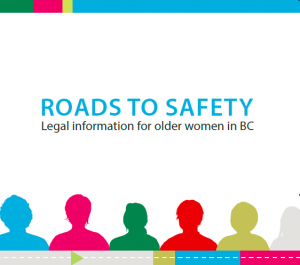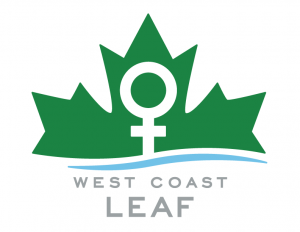Free webinar on legal issues facing older women survivors of violence in British Columbia

By West Coast LEAF
Elder abuse and violence against women aren’t separate issues, and we believe that they must not be separate conversations. That’s why West Coast LEAF (Women’s Legal Education and Action Fund) and the Canadian Centre for Elder Law are offering a free webinar for front-line service providers to explore the legal challenges that are most likely to impact older women in BC who have experienced violence.
If you support or advocate for older women in BC, we invite you to join our free two-part webinar on Tuesday May 24th and Tuesday May 31st from noon to 1 pm Pacific Time. We will introduce our new 90-page plain language legal handbook for older women fleeing violence, called Roads to Safety, and offer an overview of some of the legal topics it covers:
TUESDAY MAY 24th – PART 1
• Decision-making rights and capacity, including for women with dementia and mental health diagnoses
• Substitute decision-makers and the abuse of decision-making authority
• Protection orders and peace bonds
• Options to assist older women who are facing abuse and cannot take action to protect themselves
TUESDAY MAY 31st – PART 2
• Public pensions
• Basics of property division after separation or divorce, including pension division
• Steps to protect assets in cases of financial abuse
Each session will be framed by discussion of the insights that 450 older women shared with us in nine different languages as part of the Older Women’s Dialogue Project. Throughout the webinar, we’ll maintain a focus on the gendered dynamics of violence against older adults. We aim to prompt reflection about how legal challenges in the aftermath of abuse can vary based not only on age and gender, but also based on ability, citizenship status, Indigenous identity, language, access to financial resources, and more.
We hope you will come away with greater confidence in talking to older women in BC about their legal rights and options in the context of abuse.
This webinar is part of the Older Women’s Legal Education Project, a collaboration between West Coast LEAF and the Canadian Centre for Elder Law. Funding has been generously provided by the BC Council to Reduce Elder Abuse.
Space in the webinar is limited to 100 people. Please register now at https://attendee.gotowebinar.com/register/1678353196952104195
Questions? We would love to hear from you! Please contact Alana Prochuk at education@westcoastleaf.org or 604-684-8772 extension 117.


